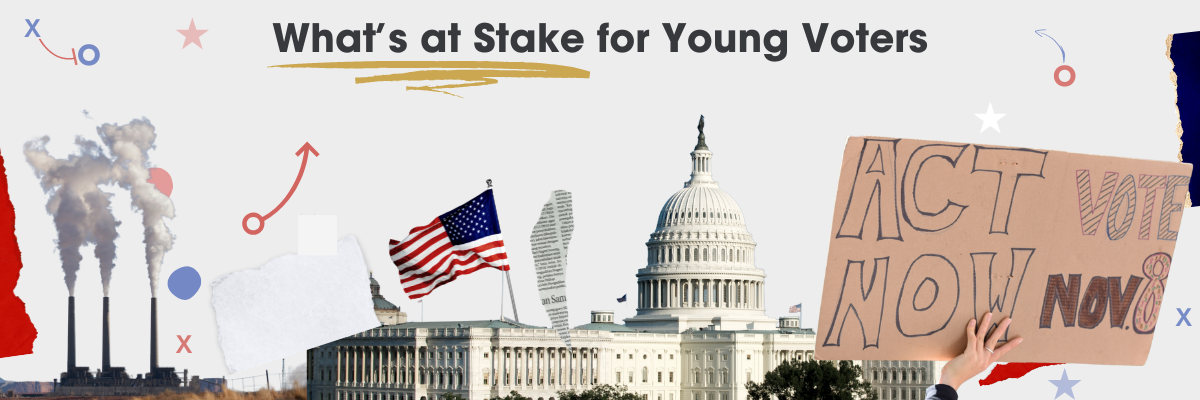Climate Voting: What’s at Stake for Young Voters and Important Races
By Jessie Cohen (TCI Ambassador) and introduction by Javan Santos (TCI Policy Manager)

There is a reasonable frustration that young people have with the government and voting, especially on climate. Oftentimes, young people feel pressure to take the climate crisis into their own hands. The climate crisis, though, is not a burden that can be shouldered by individuals alone. My hope is that young voters can find empowerment through the fact that the government exists to work for the people who elected them. If you don’t like the way that the government operates, voting is a way to change that government, so there’s power in making a change that’s more aligned with what you want.
According to the Tufts Center for Information and Research on Civil Learning and Engagement, about half of all eligible voters aged 18-29 turned out to vote in 2020. There was also a 79% jump between this age bracket between the 2014 and 2018 elections, meaning in the last two elections, both midterm and general, have shown monumental growth for young voters.
Both Jessie and I work with The Climate Initiative, a nonpartisan, youth focused climate change organization that seeks to educate, empower, and activate youth on climate action, and one of the most impactful climate actions young people over 18 can make is to vote.
As the primary elections close and the ink dries on the Inflation Reduction Act, it’s important to recognize that the climate crisis is on this and every election ballot for the foreseeable future. In an effort to keep this momentum moving forward, it’s important to understand your candidates. Jessie Cohen is an amazing bright young climate organizer, and she’s compiled a list of some of the most important races this coming election. – JS
Your candidates on the environment: A guide to high-profile midterm candidates on environmental issues.
With midterm elections right around the corner, voters are beginning to take a closer look at their candidates. This midterm season features several close or high-profile match-ups that will drastically impact politics across the country. Here, we take a look at six of those match-ups, including governor and Senate races, breaking down your candidates’ campaign platforms and environmental voting record. Here is where key candidates stand on environmental issues.
Senate:
Marco Rubio (R–incumbent)
Representative Rubio’s platform does not address environmental issues. He opposes government funding of renewable energy and federal regulation of greenhouse gases. Rubio has stated that he believes the best way to address climate change is through a free-market approach, not government mandates.
In 2021, Rubio received a score of 15% from the League of Conservation Voters, an environmental advocacy group, with a lifetime score of just 7%, meaning he has voted pro-environment 7% of the time.
Val Demings (D):
Unlike her competitor, Demings has made environmental issues a key part of her campaign. The Representative’s campaign website states “Val Demings takes threats to our environment seriously, because they are threats to Floridans’ jobs and way of life. That’s why she opposes offshore drilling off Florida’s coasts, and why she has delivered funding to combat the toxic algae that impacts our shores and waterways”.
Over the last three years, Demings has voted yes on all environmental legislation to pass through Congress. She is endorsed by the LCV and received a score of 100% from them in 2021. Her lifetime LCV score is 97%.
Jessie’s pick: Val Demings
Governor:
Ron DeSantis (R–incumbent)
Governor DeSantis’ campaign promises include providing historic levels of funding to protect Florida’s environment. He plans to continue work on Everglade restoration and fighting algal blooms. DeSantis’ environmental successes during his tenure include signing the Florida Wildlife Corridor Act, a bill aimed at addressing habitat loss, and dedicating more than $50 million to manatee protection.
DeSantis also has some history of voting in favor of environmental legislation in Congress. However, many environmental groups accuse DeSantis of “greenwashing”. The Florida chapter of the Sierra Club has called his voting record “abysmal”, stating that the governor avoids addressing the root causes of climate change. The Sierra club also points out that his environmental plans include no mention of transitioning from oil and coal to clean energy. Additionally, the LCV gives DeSantis only a 2% lifetime score.
Charlie Crist (D)
A key component of Crist’s platform is his dedication to Clean Water for All. Crist’s campaign website lists his environmental goals as reducing run-off, limiting harmful algal blooms, replacing polluting urban septic tanks, restoring and protecting Florida’s wetlands including the Everglades and Lake Okeechobee, and fully funding Florida’s Department of Environmental Protection.
Crist received a 2021 LCV score of 100%, with a lifetime score of 94%. He has voted in favor of all key environmental legislation since 2019 and is endorsed by both the Sierra Club and LCV.
Jessie’s pick: Charlie Crist
Governor:
Kathy Hochul (D-incumbent)
Hochul became New York’s first female governor in August of 2021 following the resignation of Andrew Cuomo and is running for reelection in November. Her record on environmental issues is mixed, receiving a score of 68% from the LCV. Historically, Hochul has supported oil and gas drilling in New York. She has also expressed her support for the Keystone XL pipeline, a project that was shut down by the Obama administration due to environmental concerns.
The governor’s future plans include significant investments in clean energy infrastructure including setting a zero-emissions requirement for New York school buses by 2035, the first requirement of its kind in the country. She has also proposed $4 billion for an Environmental Bond Act that would provide funding for climate and environmental related projects, the biggest of its kind in New York’s history.
Lee Zelden (R)
In his time in government, 193 environmental bills have pased Zeldin’s desk. For 164 of these bills, Zeldin voted against environmental protection. He voted for environmental protection 29 times. In 2021, Representative Zeldin received a score of 17% from the LCV and has a lifetime score of 14%. Lee’s campaign platform includes no major environmental provisions.
Jessie’s pick: Kathy Hochul
Senate:
Chuck Schumer (D-incumbent, Senate Majority Leader)
Senator Schumer has drawn criticism from New York’s environmental activists for failing to take the lead on environmental issues. However, activists recognize that while he is not a leader on the issue, Schumer reliably votes pro-environment, especially in the last several years. The Senator received a score of 100% from the LCV in 2021 with his lifetime score sitting at 93%, up from 71% in 2015. These scores, however, do not reflect Schumer’s moves to put Manchin’s Dirty Side Deal to a vote. Schumer attempted to put the bill which would expand fossil fuel production alongside funding to prevent a government shutdown into the same bill, and that tactic was intentionally to pressure Democrats to vote to expand fossil fuels. Ultimately, the move failed, but we should be watching whether this fossil fuel expansion bill returns in some other form.
Joe Pinion (R)
Joe Pinion is a newcomer to the political arena. He is a former political news commentator, and has written somewhat extensively on the issue of environmental partisanship. Pinion, who is 39, aligns himself with a younger wave of conservatives who are increasingly worried about climate change, which he calls “the seminal issue of our time”. He writes that both sides of the political isle have weaponized climate issues for partisan gain, openly criticizing the GOP for viewing environmentalism as a political issue as opposed to a moral one and perpetuating climate denial and chastising the political left for shutting the GOP out of climate conversations. Pinion writes continued climate denial by high profile Republicans has left the party “crippled” and feels that these views do not align with the opinion of the majority of younger conservatives. The political newcomer hopes to change the conversation on climate change across the board.
Jessie’s pick: Voters should consider other platform items when making a choice in this election.
Governor:
Gretchen Whitmer (D-incumbent)
Often a political wildcard and critical swing state in federal elections, Michigan is deeply divided on climate issues. During her time as governor, Whitmer has laid the groundwork for significant climate action, including blocking fossil fuel infrastructure in the state and working to stop Line 5, and oil pipeline that runs beneath the Great Lakes and has drawn major environmental concern. She has also taken steps to ensure that these actions cannot be undone by her predecessors. However, she is criticized by some activists for failing to deliver on major climate action. The governor is endorsed by both the Sierra Club and the Michigan LCV.
Tudor Dixon (Re)
Another first time politician, Dixon is a former conservative commentator with a history in the steel industry. The republican candidate’s campaign platform does not address climate issues, but Dixon has made it known that she supports continued use of Line 5. Dixon is endorsed by former President Donald Trump who has a history of climate denial.
Jessie’s pick: Gretchen Whitmer
Senate:
John Fetterman (D)
A major issue on Lt. Gov. John Fetterman’s campaign platform is holding Big Oil accountable. He also states that he hopes to transition Pennsylvania to clean energy sources. In 2009, the lieutenant governor championed the American Clean Energy and Security Act, which did not make it to the Senate floor, but did secure Fetterman’s reputation as a pro-environmental candidate. He has been spotlighted for his environmental advocacy in publications including the New York Times and Rolling Stone.
While Fetterman appears to be pro-environment, his record on environmental issues is inconsistent. Fetterman has repeatedly voted pro-fracking, even supporting fracking projects in his hometown, saying fracking wouldn’t increase pollution in the area. He is criticized by activists for backing away from environmental issues as they become more divided along party lines.
Fetterman is endorsed by the LCV.
Mehmet Oz (Re)
Mehmet Oz, better known as Dr. Oz, is a retired cardiothoracic surgeon and host of the long running talk show “The Dr. Oz Show”. Like his competitor, Oz is pro-fracking and hopes to ramp up domestic oil and gas production.
Oz’s campaign seems to be playing into the partisan nature of environmental issues and not necessarily reflecting Oz’s own views. Historically, Oz has spoken out against fracking, citing it’s adverse health effects, spoken out in favor of federal pollution regulation, urged the Obama administration not to approve toxic herbicides, and encouraged investment in renewable energy.
During his campaign, Oz has stated that the idea that “carbon is bad” is “a lie” despite the fact that it has been scientifically proven over and over that CO2 in the atmosphere is a huge contributor to climate change.
Oz is endorsed by former President Donald Trump.
Jessie’s pick: John Fetterman
-Jessie Cohen and Javan Santos




